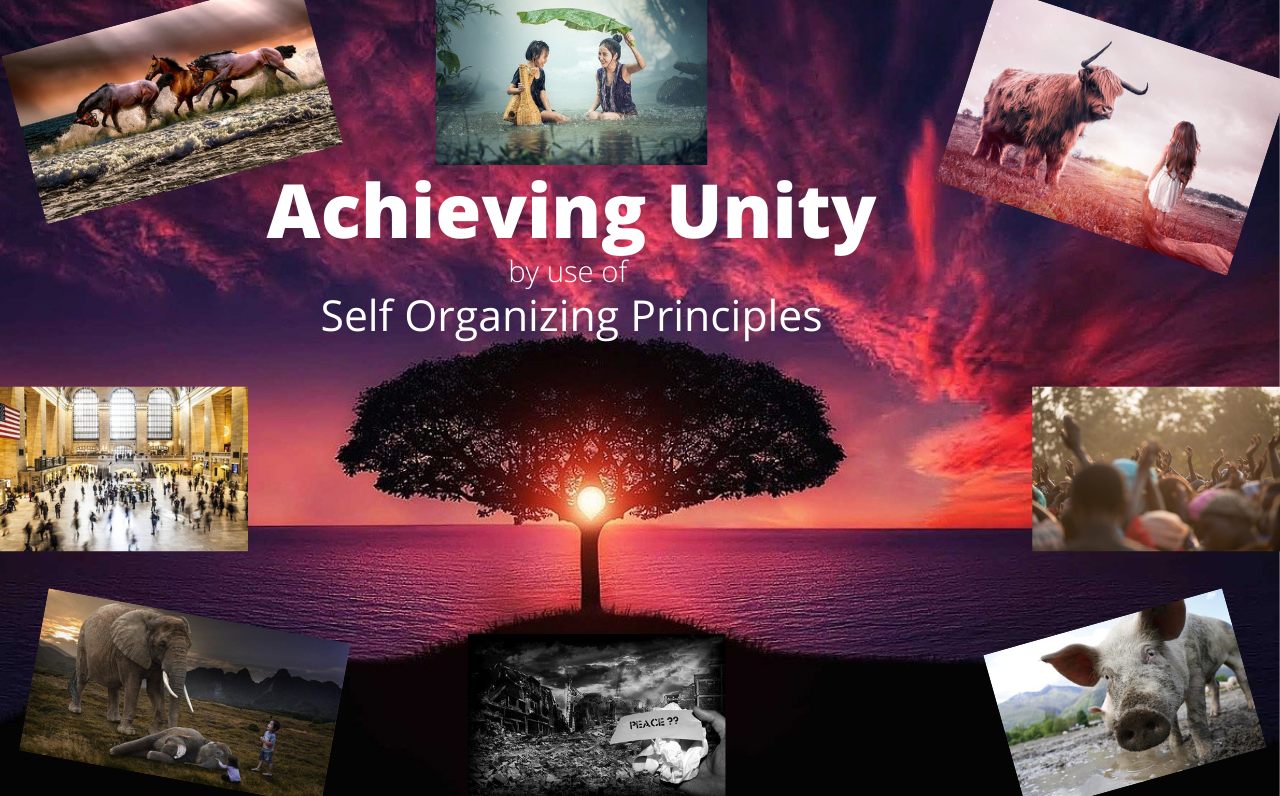
We often hear that we are all united. Yet we have borders and walls and we live in a world of divisions, separated by physical and mental barriers. Without pretending to be the truth, the following article tries to stimulate our inner curiosity. I explore why unity is desirable and perhaps even necessary from my vantage point. For me, unity means achieving coherent collective intelligence leading to collective actions that will have a greater impact than individual impact alone. I believe that this can be achieved through the use of certain organizational models that are not widely used today. In order to take into account the inherent complexity of today’s world, the organizational model discussed to achieve this is centered on self-organized systems. I wrote this article as part of my personal quest for Dharma, with myself as the main target. On the other hand, I sincerely hope that the principles outlined can be useful to others.
The following is inspired by and accompanies a talk given at the “Veganism and Global Transformation” Convergence room at the Peace Weekend 2020.
The “Veganism and Global Transformation” Convergence room explores the idea that when we transform ourselves and adopt a Vegan ethic of compassion for all beings in our daily choices, we transform our world into a peaceable kingdom. Conversely, when we consume products of violence in our daily choices, we shatter the peace and perpetuate systematic oppression in our world.
Why Achieve Unity

More often than not, when we try to achieve change, we do so without having a clear objective as to why we are doing it. We feel that the why is implicitly obvious. Even when we ask the why and find the first answer to that question, our first answer is usually not the real reason and it is relevant to ask the why question repeatedly. As we embark on this journey, let’s begin by asking the why.
From my perspective, unity is desirable because separation breeds rivality. One sometimes has the impression that competition is good, by natural fallacy, because it is present in nature (survival of the fittest), or because it allows technological breakthroughs to advance. I do not contradict any of these perspectives, in fact perhaps they were appropriate in the past. However, competition will undoubtedly lead to a “win-lose” dynamic.
Therefore, those who manage to win the current game of short-term self-interest in which we have found ourselves through the evolutionary forces of mutation, natural and sexual selection, will “win” and rise to the top by exploiting all others. From generation to generation, inequalities have increased and levels like today have never been seen before, between members of our species, or between humans. Today it is easy to see that one human has political or economic power more than a million times greater than another, an imbalance never before seen in nature. Add to this the great technological power of CRISPR, nuclear weapons, drones, industrial farms and sea trawlers, and the risks of astronomical suffering and extinction are now extreme. In fact, we are already experiencing more suffering than ever before, and we are rapidly approaching great odds of self-destruction due to multiple causes, climate change, ecosystem collapse, pandemics, nuclear wars being just a few.
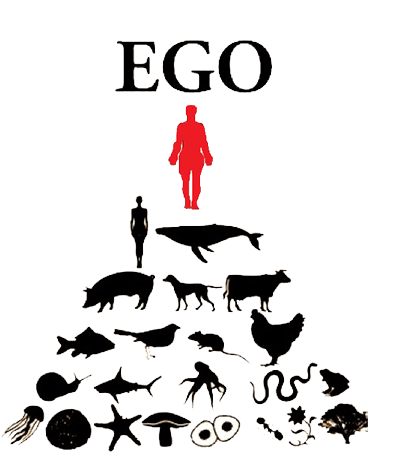

I consider that we have now reached a bifurcation in our evolutionary path. We have the choice to go towards oblivion, or towards utopia, transcending our competitive spirit and our egotistical instincts. Perhaps I would even say that we no longer have a choice, that chaos and collapse are inevitable and in many ways, already here. How we pass through this period will shape the future.
"Think of it. We are blessed with technology that would be indescribable to our forefathers. We have the wherewithal, the know-it-all to feed everybody, clothe everybody, and give every human on Earth a chance. We know now what we could never have known before -- that we now have the option for all humanity to make it successfully on this planet in this lifetime. Whether it is to be Utopia or Oblivion will be a touch-and-go relay race right up to the final moment."
Sense making requires coherent collective intelligence
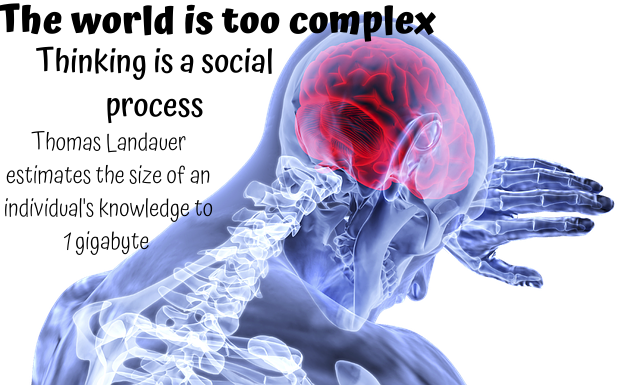
The world we live in is incredibly complex. We manage to make sense of it through collective thinking and the use of reductionist models of reality. Most of the time, once humanity has solved one problem, it creates new ones. In order to make complex decisions that could have major side effects in the future, we will need more than one brain. Even to understand the complex economic, political and cultural dynamics we are experiencing, sometimes one brain is not enough. In fact, based on Thomas Launder’s findings, a brain can only accumulate about one gigabyte of knowledge in a lifetime. The good news is that thinking is a social process. The bad news is that we have not yet managed to scale the thought process to the size of humanity.
When we accept this, I think there is a new sense of humility. We no longer need to be right in all circumstances and believe that those who have different opinions are “stupid” or “bad”. By moving away from ineffective mindsets of judgment, we can find better reasons why people believe different things, such as this Ted Talk explains in Why do we believe things that aren’t true? We might even consider that we are not totally right ourselves, as discussed in Why you think you’re right — even if you’re wrong.
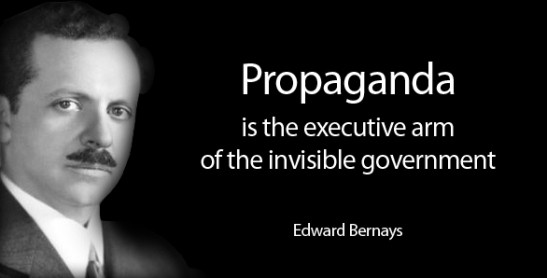
To make matters worse, we are constantly being manipulated, by corporations or governments. Our desires and consent are manufactured in many ways by outside sources we are unaware of. The life story of Edward Bernays, considered the father of propaganda in America and the nephew of Sigmund Freud, is the best illustration of this. The critically acclaimed BBC documentary “The Century of the Self” sheds light on this subject.
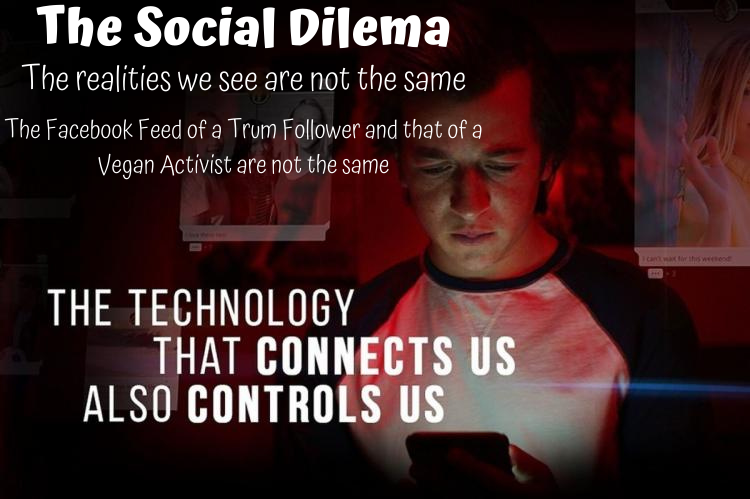
Driven by one main motivation, profit, our social technology further fuels this process of manipulation. In most cases, our technology makes the reality we see no longer consistent with the reality of others or close to any truth. To take a simple example, the Facebook feed of a vegan activist and that of a Trump supporter will look nothing alike. These “biased” realities will become the model of the person’s reality. Netflix’s film, The Social Dilemma, shows this well. Once again, I think it is important to emphasize that this is not done with purely malicious intent. The main goal is not that the world’s most advanced artificial intelligence systems manipulate us to sell us false news, but simply to get us addicted to hyper-stimulation in order to come back for more – the rest is a consequence. The constant war for our attention ensures that we are good “products” for the advertisers who pay for the platforms we use.
All this leads to an epidemic of false beliefs, polarization, agressivity and multiple factions competing in a cultural and narrative war. Although much of this aggressivity is also present because of past traumas, I fear that it maintains a culture of “us against them” and divides the world into allies and enemies, victims and oppressors. I do not think that this is fertile ground for effective social change, I fear that it increases hatred and, therefore, suffering. I think that we should make less effort to make our views known to people, and instead allow and grow the sovereignty to understand the world so that we can participate together in its new co-creation.
Further Sense Making References
Already One
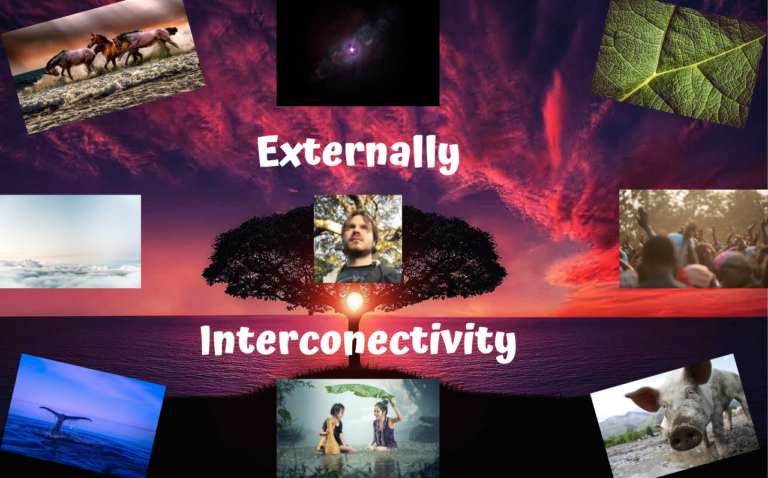
I am part of this cosmos. I am made of the same atoms that make up trees and all animals, water and rocks. There is no fire of life in me without water and air without the ocean and the forests that are there to clean the air I need with every breath.
Outside of us, if I look just a little outside of my little self, we are all already one, because we are all very deeply interconnected.
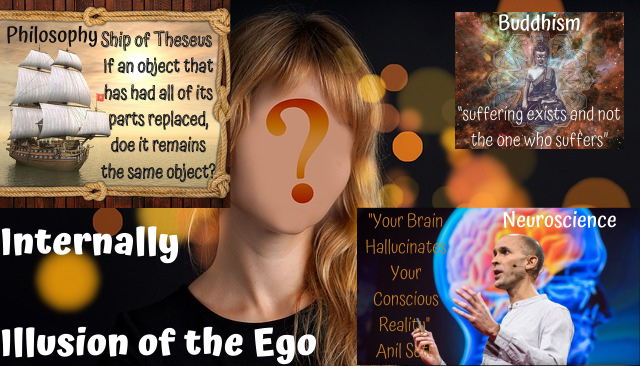
Who am I? My memory? My mind? My body ? My personality ? My inner world is the other side of the coin. The illusion of ego is the belief that I have a stable and unchanging identity, separate from everything else. This is the story I grew up with, like most people in the West. From my point of view, this story is just a story, an illusion, like the water we perceive as real in the desert in the distance, but which is in fact a mirage. Personal identity has been challenged by philosophy, Buddhism (and other religions and spiritual practices), and lately by the neurosciences.
Imagine a wooden boat that is being moored and is beginning to rot. To repair it, the parts are replaced one by one, part by part all through the boat, plank by plank. When all the parts have been replaced, is the boat still the same? This question can be extended to personal identity.
Buddhist practitioners ask where is this “I”, is it in the body? Not when I answer “I am sad”. Is it in consciousness? Not when I answer “I am bleeding”. Observing the impermanence of all things, Buddhism also supports the idea that the perspective of a single, autonomous and enduring “ego” is contrary to reality and goes on to state that “suffering exists, but not the one who suffers”.
Finally, neuroscience has begun to study the phenomenon of consciousness and supports the idea that our conscious reality is a hallucination, as described by Anil Seth in Your brain hallucinates your conscious reality.
If there is no “ego” or I, it can be argued that egoism is irrational, as it is said here
Because of the understanding of the illusion of the ego, it is indeed irrational to be selfishly preoccupied with a single suffering, “one’s own”, that is, the suffering of an illusory Self, without being preoccupied with all the sufferings of the cosmos until the end of time. Why pay pension contributions for the one I will be in 20 years if he is not me, rather than the neighbor? Rationally, this lack of identity of the person over time, which stems from impermanence, would mean contributing for everyone. And also that everyone inherits from everyone else. The Bodhisattva, who is an emblematic figure of Buddhism, is condemned to concern himself with the suffering of future generations and all sentient beings as much as with “his own”.
Why Self-Organizing Systems
Self organizing systems could be said to be an emergent property of complex systems.
Almost all systems that are not created by humans, such as ecosystems and living organisms, are complex, so there are many different examples of this in nature.
As the size of a movement or organization increases, and as the desired level of participation of all agents and the desired collective coherence increases, the relationships and organizational model become complex. It therefore makes sense to use self-organized systems to deal with this complexity.
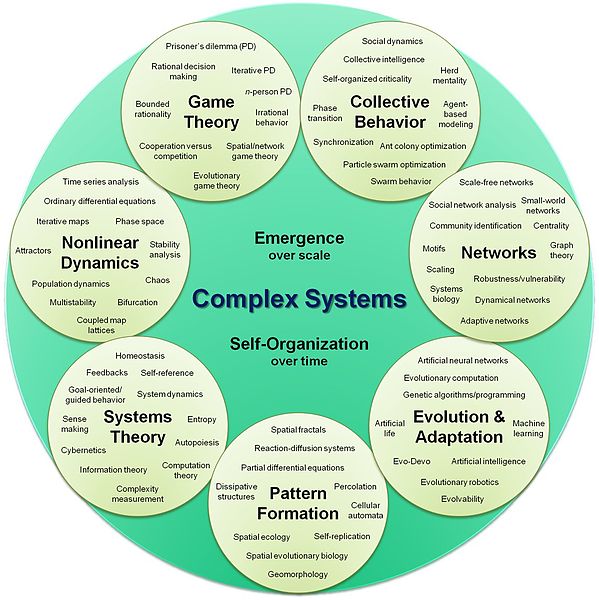
Forest Organizational Model

- No clear boundaries – lack of membrane
- No centralized information system
- No coherence
- No agency
- Homeostasis
Slime Mold Organizational Model
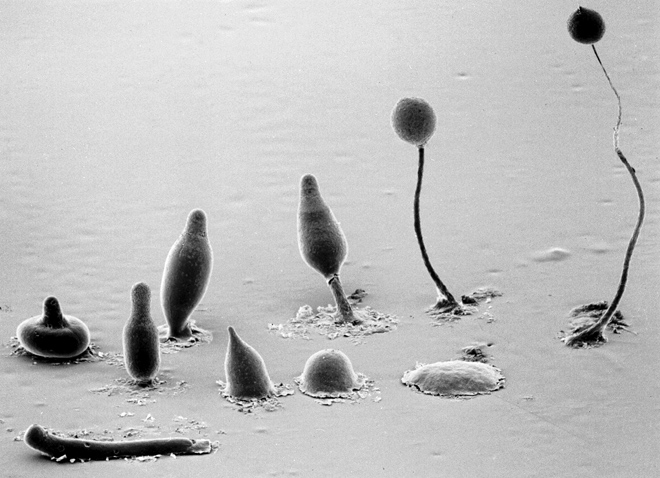
- The slime mold spends most of its life as a single-celled organism
- Under stress thousands of slime mold cells aggregate to form a mound
- Coherent dynamics and no internal rivality, external competition
- Chemical communication with each other
Human Body Organizational Model
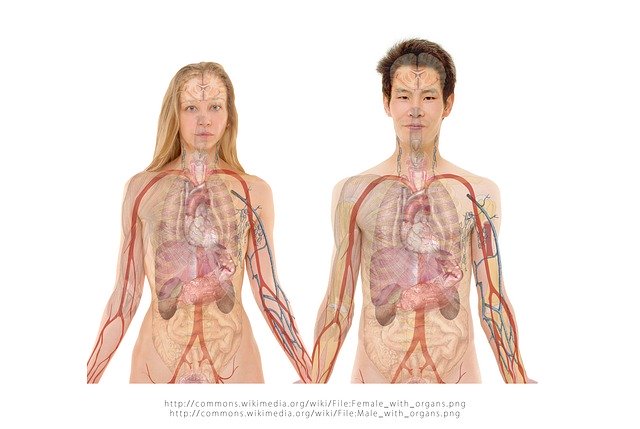
- Complex Self-Organization: Cells, Tissues, Organs, Organ Systems, Organism
- Goal of internal systems aligned
- High internal coherence with no internal competition.
- Autonomous cells and systems & Centralized Sense Making Capacity
- Eye and Ear perspectives are not in competition but in parallax
Self Organizing Systems Models History
Holarchy
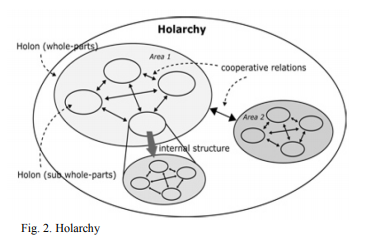
- A model of reality.
- “holons are self regulating open systems which display both the autonomous properties of wholes and the dependent properties of parts.” – (Koestler 1967, Appendix I.1)
- The world is not composed of atoms or symbols or cells or concepts. It is composed of holons (Wilber 2001, p. 21).
Holarchy

- A Corporate Organizational Model
- Authority resides with the Constitution
- Organization centered on it’s Purpose and Structure Adapts
- People Occupy Roles; Roles Grouped Into Teams
- Roles have Accountability and Purpose
Open Self-Organizing Systems

- Based on Holacracy and used by social movements to scale up
- More Flexibility and Autonomy
- https://sos.rebellion.support/



